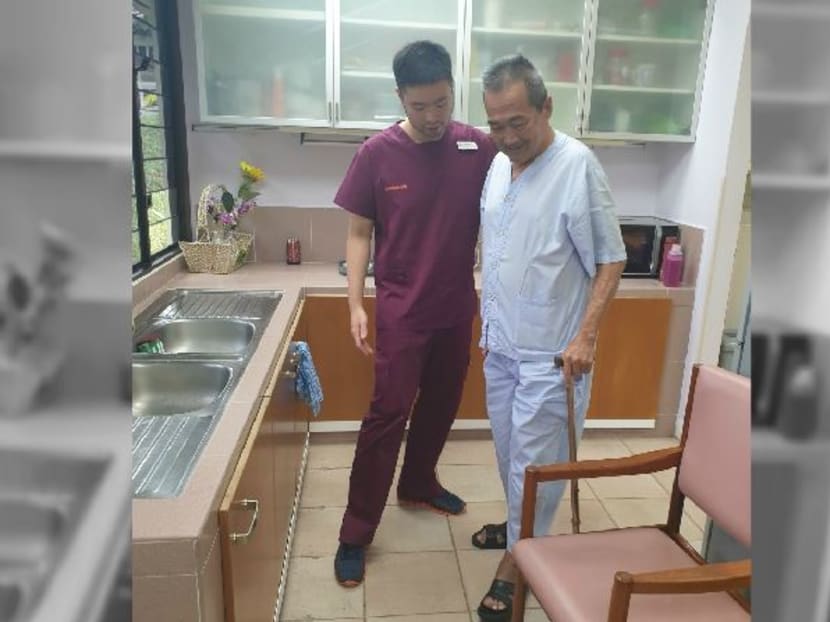Alexandra Hospital to provide integrated care for patients, from admission to rehab
SINGAPORE — Mr Cheng Yam Kwang, 66, suffers from gout as well as other chronic conditions such as hypertension, high blood pressure and ischemic heart disease.

With the integrated system, patients like Mr Cheng Yam Kwang are cared for by a team from the point of admission, all the way through to rehabilitation and discharge.
SINGAPORE — Mr Cheng Yam Kwang, 66, suffers from gout as well as other chronic conditions such as hypertension, high blood pressure and ischemic heart disease.
In 2014, he found himself admitted for one month in Alexandra Hospital, then under the management of Ng Teng Fong General Hospital (NTFGH). Then, he was transferred to Ang Mo Kio-Thye Hua Kwan Community Hospital for another month to undergo rehabilitative treatment.
“It was very complicated,” he said. “I must always change doctor, and the nurses and staff also change.”
Now, patients like him who have to shuttle between hospitals for different stages of care may get some reprieve.
Alexandra Hospital, part of the National University Health System (NUHS) since June this year, has become the first in Singapore to run an integrated general hospital model for patients to receive acute, sub-acute and rehabilitative care under one roof.
This was announced on Friday (Dec 14) by NUHS and the Ministry of Health's Office for Healthcare Transformation (MOHT) at the launch.
With the integrated system, patients are cared for by a team from the point of admission, all the way through to rehabilitation and discharge.
Outpatient clinic appointments are also consolidated under one principal doctor, allowing the patient to conduct one rather than multiple appointments.
At the hospital, one care team is attached to a ward of about 30 patients. Each team is headed by a lead physician and supported by a multi-disciplinary team of doctors, nurses, therapists, medical social workers, pharmacists and care managers.
There are five care teams covering a total of 176 beds in the hospital.
Since it was set up in June this year, 2,500 patients have been through this care system.
Mr Cheng was one of those to be admitted to Alexandra Hospital for integrated care in June this year due to a gout flare-up. After two days of treatment for his acute condition, he was able to start his rehabilitation sessions for the next three weeks with the same team that took care of him before.
As the rehabilitation centre was located within the hospital, there was no need for him to transfer to a different hospital or venue.
“It’s very helpful because they (the doctors) don’t have to repeat and ask the same questions again," he said. “Now it is like one stop, one-way traffic… like they are family and friends.”
NUHS came up with the concept with MOHT, which was formed in January to address key challenges faced by the healthcare system and work out possible solutions for healthcare transformation.
The two parties took in studies of similar models in the United States, as well as feedback from residents in Queenstown. The district has one of the highest concentrations of senior citizens in the western part of Singapore — with 19 per cent of an estimated 100,000 residents aged 65 or above.
Professor John Wong Eu Li, chief executive officer of NUHS, said: “The implementation of the (integrated) model is in line with NUHS’ and Alexandra Hospital’s aim to build a new model of hospital care and develop a health-empowering campus around Queenstown. We are harnessing the strengths and expanded capacity of the whole of NUHS and its partners to transform how illness is prevented and managed holistically, both in the hospital and in the community.”
Unlike community hospitals which are more suited for patients with non-acute, non-medical cases with no underlying chronic conditions, the integrated model plugs the gap by providing an option for patients who regularly hover between acute and rehabilitative care.
There are plans for the model to be adopted by other hospitals in future. While no schedule was set, Prof Wong said that the model could be adapted in NTFGH in Jurong, which has 400 beds.
“It’s very challenging to do it in an existing hospital that has been running for several years. We could test it in an existing hospital but to scale it up, it is always nice to have a fresh slate. So we were testing this in the National University Hospital (NUH) for at least one-and-a-half years and we are scaling it now at Alexandra Hospital, and then bringing back some of the successes back to NUH and to NTFGH,” he added.
Alexandra Hospital is also working with MOHT to introduce initiatives with a greater focus on the patient. This includes the Technology Enabled Nursing Documentation mobile application, which allows nurses to document the needs of the patient from his or her bedside via a tablet device, instead of returning to the nurses’ station or office to file the documents. The convenience of the app has allowed nurses to increase their contact time with patients by five to 10 minutes, instead of spending time doing paperwork.
Two wards in Alexandra Hospital have been earmarked to be “wards of the future”.
The hospital’s chief executive officer, Associate Professor Jason Phua, said: “We think of these wards as a very, very intelligent shell. It’s a space for us to put in plug-and-play, all the different gadgets that we need for artificial intelligence (AI) and technology.”
While there is no specified number of beds for these “future wards”, Assoc Prof Phua said that it would be able to use robotics and AI for predictive modelling to help the hospital profile its patients and to highlight patients that could require more attention and resources.











